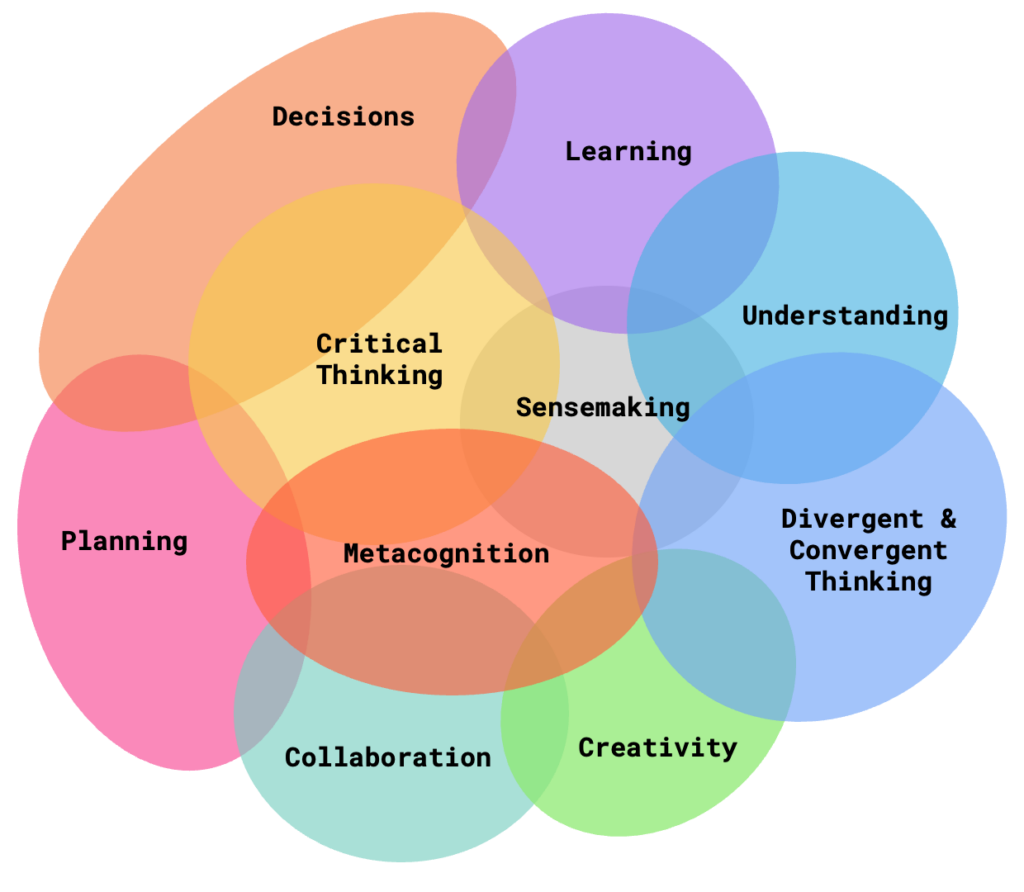Much AI research focuses on solving specific tasks for people – generating content or automating processes. While such systems may be powerful, there are risks that this approach impact the way people think and therefore learn, build skills, and deploy expertise.
The Tools for Thought (T4T) team aims to help researchers and developers imagine how AI might help people to think better, so that:
- as well as getting the job done, it helps us better understand and figure out the job.
- as well as creating content, it helps us think more critically and with more insight throughout an entire workflow.
- as well as seeking speed and efficiency, it helps us create outcomes that are more effective and of higher quality because they are the product of better answers from better questions.
- as well as augmenting individual cognition and tasks, it augments collective cognition and workflows.
- as well as automating known processes, it helps organisations predict and explore the unknown.
Outputs of T4T include principles and guidelines for supporting cognition in any user experience, and systems and new technologies that stand as practical instantiations of what it means to support better thinking using AI. See our recent blog post on The Future of AI in Knowledge Work: Tools for Thought at CHI 2025.

Workstreams
Thinking By Doing: How should we re-invent tools by using AI to support human cognition in the moment?
Critical Thinking with AI: How might we design interfaces to promote critical thinking about task and AI output when working with generative AI
- The Impact of Generative AI on Critical Thinking: Self-Reported Reductions in Cognitive Effort and Confidence Effects From a Survey of Knowledge Workers
- AI Should Challenge, Not Obey
- AI, Help Me Think—but for Myself: Assisting People in Complex Decision-Making by Providing Different Kinds of Cognitive Support
- Exploring Perspectives on the Impact of Artificial Intelligence on the Creativity of Knowledge Work: Beyond Mechanised Plagiarism and Stochastic Parrots
Explanations from AI: How might we enable better AI explanations for LLMs by providing user control over their characteristics and formation?
Diversity of Thought with AI: Can AI agents support conversations with users that are rich, meaningful and well rounded, and that give humans agency over the discussion?
Learning with AI: What impact do generative AI tools have on people’s understanding and memory of what they are doing, and how can they help build core cognitive capabilities?
Working Together With Purpose: How should we re-invent workflows by using AI to support collaborative metacognition?
Metacognition & AI: How do generative AI systems impose metacognitive demands on users, and how might they instead incorporate metacognitive support strategies?
- The Metacognitive Demands and Opportunities of Generative AI
- Ironies of Generative AI: Understanding and mitigating productivity loss in human-AI interactions
- The New Calculator? Practices, Norms, and Implications of Generative AI in Higher Education (opens in new tab)
Working Together with Purpose: How are complex collaborative intents formed? How are they formed and how do they evolve over time?
- Coming soon
Intentional Meetings with AI: How might we leverage generative AI to encourage self reflection and self awareness around collaboration, in order to make meetings more intentional?
- Mental Models of Meeting Goals: Supporting Intentionality in Meeting Technologies
- Are We On Track? AI-Assisted Active and Passive Goal Reflection During Meetings
- What Does Success Look Like? Catalyzing Meeting Intentionality with AI-Assisted Prospective Reflection
- Designing Interfaces that Support Temporal Work Across Meetings with Generative AI
- The CoExplorer Technology Probe: A Generative AI-Powered Adaptive Interface to Support Intentionality in Planning and Running Video Meetings
Generative UI for AI (with the ENCODE project): How might we create AI generated interfaces that support task decomposition in the context of data analysis, as well as provide affordances that allow for verification?
People
The Tools for Thought team is interdisciplinary, mixing experts in social science, computer science, engineering, and design. The team is co-lead by Richard Banks and Sean Rintel.
Members
Advait Sarkar
Senior Researcher
Britta Burlin
Principal Design Manager
Leon Reicherts
Researcher
Lev Tankelevitch
Senior Researcher
Martin Grayson
Principal Research Software Development Engineer
Payod Panda
Design Engineering Researcher
Pratik Ghosh
Senior Research Designer
Richard Banks
Principal Design Manager
Sean Rintel
Senior Principal Research Manager
Sponsors
Siân Lindley
Senior Principal Research Manager
Abigail Sellen
Distinguished Scientist and Lab Director
Collaborators
Christian Poelitz
Senior Research Engineer
Neil Toronto
Senior RSDE
Jack Williams
Senior Researcher

